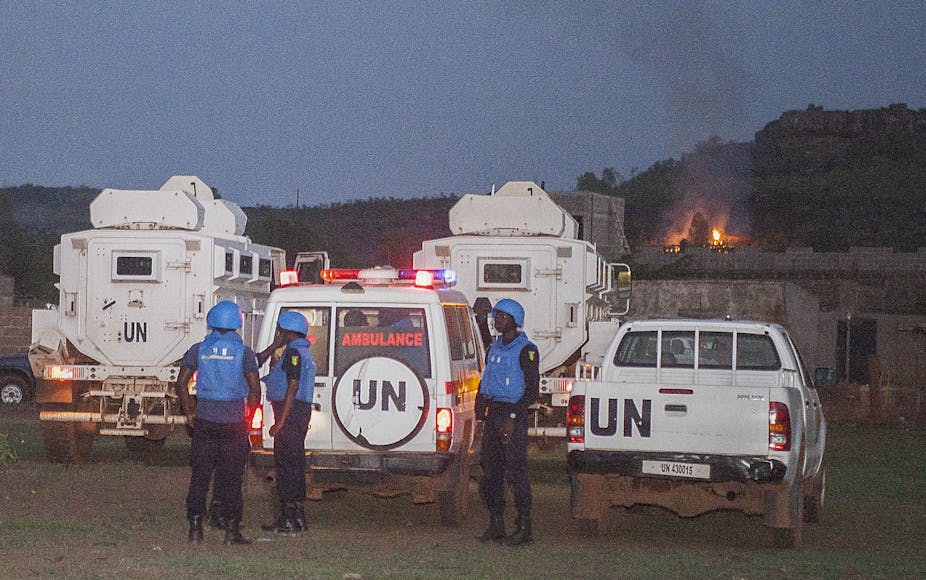For Mali, 2018 opened with measured optimism. But the year is ending with a widening gap between what many expected and the harsh realities of daily life for ordinary Malians.
It was hoped that more resolution would be found for the things that have gone wrong since the multidimensional crisis that was triggered in 2012. In under seven years, Malians have witnessed an insurgency and coup d’état, intervention by French and West African troops, the establishment of a United Nations mission, and jihadist groups reorganising to extend violence from northern to central regions.
In mid-2018, as much as the difficulties facing Mali were daunting, President Ibrahim Boubacar Keïta was able to parlay some modest signs of progress into a second term. Through his first term (2013-18) Keïta’s status quo approaches to many issues renewed the confidence of donor-partners and private investors in the core of Mali’s economic governance.
There was indeed some good news, like a stable GDP growth around 5%, a rise in agricultural productivity and below-average inflation. As a result, the International Monetary Fund and the World Bank have continued to support Mali financially through its persistent, economic, social, security, and humanitarian challenges.
Unfortunately, on many fronts, Mali is in trouble. Since the insurgency and coup d’état in 2012, despite the presence of French, United Nations, and West African troops, jihadists combined in 2017 into Jama'a Nusrat ul-Islam wa al-Muslimin’ (JNIM “Union for Supporting Islam and Muslims”), fuelling and spreading violence from northern to central regions, and beyond.
With this violence, private and public investment continues to focus on the South, where Mali’s greatest economic dynamism is concentrated. This further isolates Northern and central communities from national prosperity, and from access to basic services and opportunities for education or work.
On top of struggles to keep infrastructure and social spending within its budget targets, Keïta’s administration also faces the challenge of reopening hundreds of schools in central and northern Mali. These remain closed due to insecurity. Students, staff, and parents all fear attending schools that are targeted by jihadists as sites of French/foreign and non-Quranic education.
Add insecurity to climate shocks and marginalised populations’ and livelihood challenges get even worse. All this, along with a range of other issues, suggests that Mali’s fragile state may be tipping towards more profound failures. It will take a tremendous amount of political will and effort to turn the country’s fortunes around.
Election season
Polls will play a major role in Mali during 2019. First, in March, there will be a referendum on the creation of a Senate, as part of the implementation of the 2015 peace accord. In May, there will be legislative elections. The long-overdue regional and local elections, once expected in late 2017, then in spring 2018 are now planned for November.
All this follows 2018’s presidential elections, which were deemed credible if flawed by the African Union, the EU, and national observers. They were held amid electoral irregularities, violence, and low voter turnout.
In the end, President Keita was granted a second term, potentially to redeem the mediocre performance of his incumbent administration, especially on implementing the 2015 Accord.
When the country goes to the polls in 2019, the once energised opposition will need to seek greater coherence. Soumaïlia Cissé, official leader of the opposition, was unable to unite support for his third-time presidential candidacy in 2018. But Cissé’s failure to cohere an official, establishment opposition may encourage other, runner-up leaders to broaden their appeal and increase the relevance and inclusively of Malian party politics.
As it stands, opposition forces face the daunting task of rallying support towards May 2019, if they intend to make gains on the dominance of ruling-party coalitions in the legislative and local elections. Failure to build a strong alternative to the president’s political movement could be their undoing.
Country in crisis
There are other issues at play, too. For instance, the 2015 Peace Accord – signed between the government and rebels in the north – proposed the introduction of new regional representatives and local authorities. This has been very slow to happen. In fact, the peace process that began in 2015 and was marked by the signing of the accord has stagnated. This shows that Accord-related institutional reforms are difficult and contentious. As much as the Malian government and Accord signatories have struggled to find common ground, these issues are not primarily responsible for the spread of insecurity to central Mali.
Taken together, Mali’s north and centre are witness to attacks and retaliations by many armed actors. Jihadists, ethnic militias, former rebels, and armed bandits confront national and international forces. Human rights records on many sides are found wanting. Those who fuel inter-community violence can persuasively question the legitimacy and capacity of Malian and international forces.
Indeed, this legitimacy gap is a long-term legacy of Malian leadership. The political decline that began under former president Amadou Touré (2002-2012) will likely extend into Mali’s medium-term future. The complexity of ongoing challenges needs more comprehensive and meaningfully inclusive responses, from the country’s leaders at the top and at the grassroots.
What next?
All of this has made Mali a more dangerous place. Human rights violations have increased, with reports of torture, mistreatment, and disappearances, extrajudicial detentions and executions, the recruitment of child soldiers, and gender-based violence. Despite international security and development cooperation support exceeding 3bn EUR per year, the Malian state has failed to protect its citizens.
Thus, the Malian state remains afflicted by a chronic and “extreme” fragility, and there are no simple answers to restoring trust between communities and with the Malian state. Renewing this trust remains the greatest missed opportunity of 2018.
With an accompanying humanitarian crisis and persistent micro-level violence, Malians’ mistrust of their government could feed into broader state failure. Unless violations, corruption, and nepotism are investigated and addressed, 2019 could end even worse than it began.

